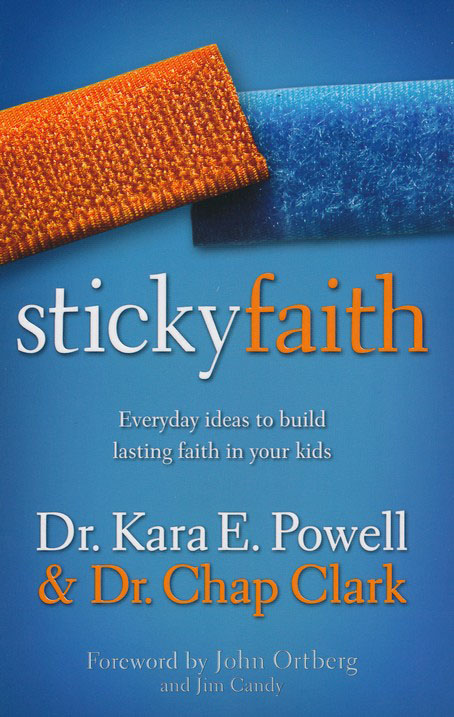
NASHVILLE, Tenn. (BP) — A 2007 LifeWay Research study found that 70 percent of young adults who attended church in high school subsequently stopped attending church for at least a year during their college years.
Perhaps just as alarming, only 20 percent of those who left the church had planned on doing so while in high school. For most, the decision was not considered far in advance.
 LifeWay’s data is not unique. Surveys by Barna and Gallup have found similar dropout rates, leaving youth and teens experts wondering: What can be done?
LifeWay’s data is not unique. Surveys by Barna and Gallup have found similar dropout rates, leaving youth and teens experts wondering: What can be done?
A new longitudinal study of 500 youth group graduates may provide some answers. Conducted by the Fuller Youth Institute at Fuller Theological Seminary, the study followed the graduates through their years in college or vocational school. The results are compiled in a book, “Sticky Faith: Everyday ideas to build lasting faith in your kids” (Zondervan).
Some of the suggestions aren’t surprising (for instance, the level of church involvement by parents plays a key role in a teen maintaining their faith walk). Other suggestions, though, may surprise Christian leaders.
Baptist Press asked Sticky Faith co-author Kara E. Powell — executive director of the Fuller Youth Institute — about the research. Following is a transcript:
BAPTIST PRESS: What do you mean by “sticky faith”?
KARA POWELL: Sticky faith, in our context, is faith that lasts beyond high school — a vibrant relationship with God as well as with the faith community.
BP: Your book includes multiple reasons why teens leave the church when they move out or go off to college. What would you say are the top two or three?
POWELL: Our research didn’t rank reasons, so it’s challenging for me to choose the top two or three from a research perspective. Having said that, as we’ve shared our research with students and gotten their feedback, the top two or three are, No. 1, their view of the Gospel is a very truncated view of the Gospel. It’s very similar to what Dallas Willard calls the Gospel of sin management, where the Gospel has been distilled to a list of do’s and don’ts. Part of what we need to do is reframe the Gospel as God’s transforming us from the inside out. No. 2, as youth ministries become more professionalized — which is a step I applaud on many levels — it has become separated from the rest of the church. And so the typical youth group graduate leaves high school and they know their youth leader but they don’t know the overall church, they don’t know adults in that church. We’ve done ourselves a disservice by having youth ministries so silo-ized from the rest of the congregation. We need to create more inter-generational worship and relationships. And No. 3, their families are not vibrant hubs of faith. A lot of parents these days are what we call dry cleaner parents — parents who think they can bring their kids all dirty to church Sunday morning, and then pick them up 75 minutes later all clean. A lot of parents are thinking they can outsource the spiritual formation of their kids to the church. And the reality is, the best combination is a family and church working in partnership for the long-term benefit of the faith of the child.
BP: You say that teens who feel the freedom to express doubts about their faith tend to keep their faith. How can parents and churches help facilitate that?
 POWELL: Some of the parents and leaders who are most effective at engaging students in discussion about doubts share their own doubts — they don’t understand why God would allow this natural disaster or why God would allow a divorce in the family next door. As parents and leaders share their own big questions about God, that tends to create a climate where that’s more OK. I think the other thing that comes to mind is for parents and leaders to be OK not having a definitive answer [to every question], because we can’t understand everything about God. God is beyond our intellect and our ways. It’s good for a parent or leader to say, “That’s a good question and I don’t know. Here’s what I do know about God.”
POWELL: Some of the parents and leaders who are most effective at engaging students in discussion about doubts share their own doubts — they don’t understand why God would allow this natural disaster or why God would allow a divorce in the family next door. As parents and leaders share their own big questions about God, that tends to create a climate where that’s more OK. I think the other thing that comes to mind is for parents and leaders to be OK not having a definitive answer [to every question], because we can’t understand everything about God. God is beyond our intellect and our ways. It’s good for a parent or leader to say, “That’s a good question and I don’t know. Here’s what I do know about God.”
BP: Would you say, though, that there are questions that do have legitimate answers, and teens just don’t feel comfortable asking them?
POWELL: Sure. Absolutely. There are some questions that we can, using Scripture and reason and the help of good apologists, we certainly can have well-reasoned answers for students.
BP: In one chapter of the book you say that it benefits a teen’s faith to have adult mentors other than their parents. How does that help?
POWELL: As powerful as a parent is, there are just some life truths that a young person is going to absorb or hear better from somebody else other than their parent. The ideal is to form a constellation of caring adults around a kid, with other small group members, neighbors, church members, coaches, boy and girl scout leaders, teachers, etc., who are all caring for kids and praying for them and showing an interest in their life. In the book we tell a story that I love about Tony Dungy. He was trying to encourage his son, who was a high school student playing football, to have a bigger breakfast. Dungy told his son this week after week, and his son kept saying, “No, Dad, I’m OK.” Well, finally the son starts eating breakfast, and he’s making himself some toast and some eggs. Tony said, “I see you’re making a bigger breakfast.” And his son says, “Yeah, my coach at the high school said that I should.” Here this son is living with an amazing NFL coach, but it’s the high school coach down the street that he listens to about breakfast. God has designed us to live in community, and God has designed our families to live in community. So ideally we have multiple voices reinforcing the messages to our students.
BP: How do parents have a role in choosing these mentors?
POWELL: I think it depends on the age of your child. For younger children, you can be pretty strategic in whom you invite over to dinner or whom you invite to your kid’s soccer game, etc. As kids get older, I think they need to be more involved in this process. Parents of teenagers can ask their kids, “What adults do you look up to? Whom would you want to spend time with? What adults do you like?” The kids answer those questions, and the parents have a mental list of adults to try to connect with. This is not something we need to keep secret from our kids. My kids are 11, 9 and 5, and I asked them, “Who were the adults you feel like you could go to for support?” Our kids had a great time listing off the friends and the neighbors and the family members and the church members.
BP: How can churches that are located near churches help facilitate the transition from high school to college and help teens stay in their faith?
POWELL: I think it’s really simple things. If you see a college student who shows up at your church, introduce yourself to them. Find out if there’s anything they need help with in their community — do they have a way to do laundry? Have they found the right grocery store? Do they have a way to come back to church? — because a lot of students don’t have a car. An adult could offer to be a vocational mentor. If a college student walks into your church and you find out that she’s studying to be an engineer, how wonderful would it be if you could pair her or introduce her to another adult in the church who is an engineer, and talk about how faith informs the engineering work they do? Vocation is a real avenue for connecting college students with specific adults.
–30–
Michael Foust is associate editor of Baptist Press. Get Baptist Press headlines and breaking news on Twitter (@BaptistPress), Facebook (Facebook.com/BaptistPress) and in your email (baptistpress.com/SubscribeBP.asp).
















